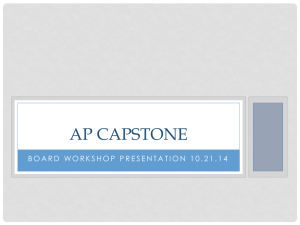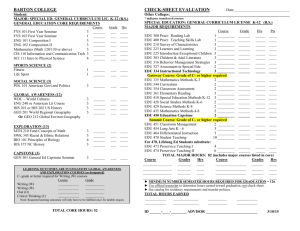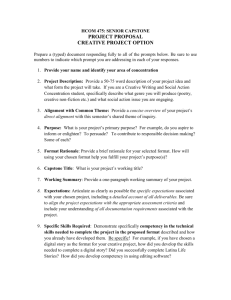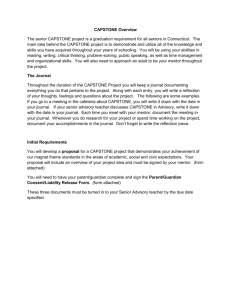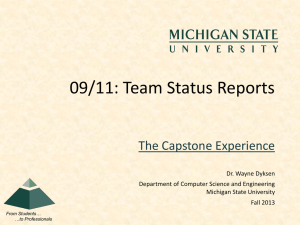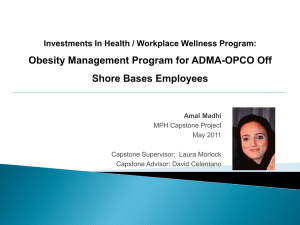Senior Seminar in Gender Studies
advertisement
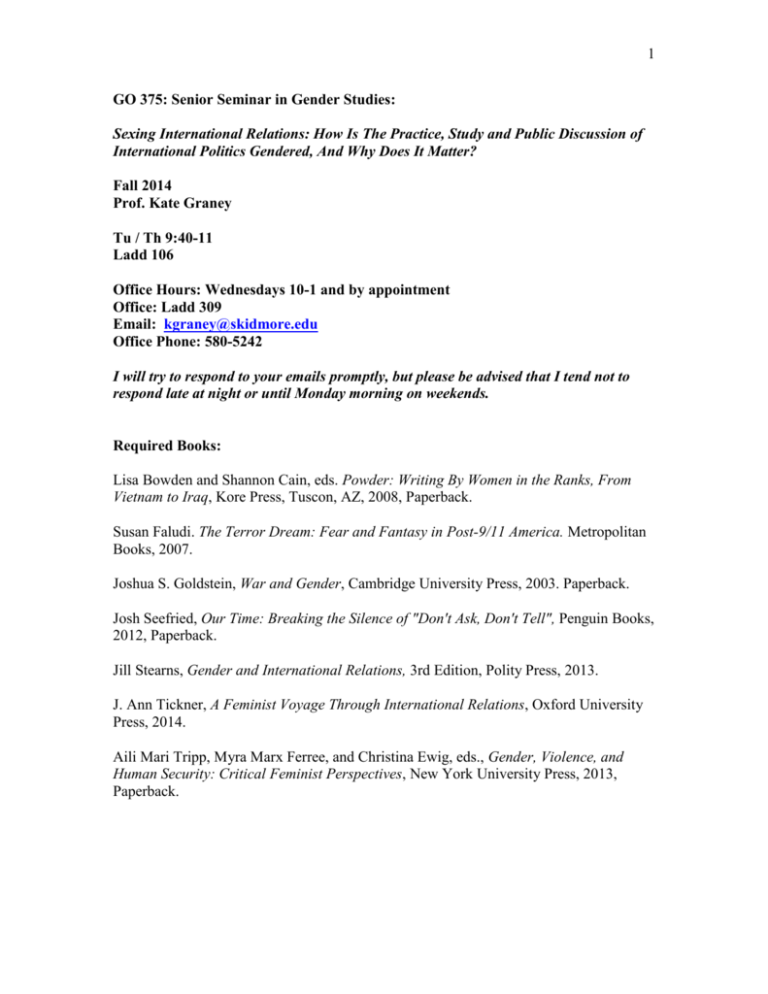
1 GO 375: Senior Seminar in Gender Studies: Sexing International Relations: How Is The Practice, Study and Public Discussion of International Politics Gendered, And Why Does It Matter? Fall 2014 Prof. Kate Graney Tu / Th 9:40-11 Ladd 106 Office Hours: Wednesdays 10-1 and by appointment Office: Ladd 309 Email: kgraney@skidmore.edu Office Phone: 580-5242 I will try to respond to your emails promptly, but please be advised that I tend not to respond late at night or until Monday morning on weekends. Required Books: Lisa Bowden and Shannon Cain, eds. Powder: Writing By Women in the Ranks, From Vietnam to Iraq, Kore Press, Tuscon, AZ, 2008, Paperback. Susan Faludi. The Terror Dream: Fear and Fantasy in Post-9/11 America. Metropolitan Books, 2007. Joshua S. Goldstein, War and Gender, Cambridge University Press, 2003. Paperback. Josh Seefried, Our Time: Breaking the Silence of "Don't Ask, Don't Tell", Penguin Books, 2012, Paperback. Jill Stearns, Gender and International Relations, 3rd Edition, Polity Press, 2013. J. Ann Tickner, A Feminist Voyage Through International Relations, Oxford University Press, 2014. Aili Mari Tripp, Myra Marx Ferree, and Christina Ewig, eds., Gender, Violence, and Human Security: Critical Feminist Perspectives, New York University Press, 2013, Paperback. 2 Learning Goals In this course, it is my hope and expectation that you will: --Read carefully and closely a number of theoretically and conceptually sophisticated texts about how the practice, study and public discussion of international relations are gendered --Be able to discuss those theories and concepts intelligently, productively, and enthusiastically both on paper (through daily response papers) and in class (through seminar discussions) --Improve both your analytical/writing skills (through daily response papers) and your public speaking / presentation skills (through seminar discussions, leading class discussions, and presenting your research to the class at the end of the semester) --Learn how to research and write a piece of “advanced research” that explores a particular theme or topic in Gender Studies from an “interdisciplinary” perspective, utilizing primary and secondary sources, and appropriately employing evidence, theories and concepts from Gender Studies to support an effective argument (through your semester-long capstone project) --Think deeply about the “real world” impacts of the material we are studying in this course for your own life, our life in the Skidmore community, the community of Saratoga Springs, politics in the United States, and the wider global community. Together with your peers in this class, you will develop and execute an appropriate campus or community engagement project based on the themes and questions raised in this course. 3 Assignments and Assessment: 1. Daily Response Papers and Class Participation (40%): In the interests of making this senior seminar as participatory as possible, your close and careful reading of the material and your informed and consistent participation in class will be worth as much as your final seminar paper. To ensure that you earn this full measure of credit, I will be collecting Daily Response Papers from you on the reading assigned on the syllabus for every class meeting. You should be sure to review your response paper before class every day and to be ready to refer to it during class. They will be collected at the end of each class. Please see the guidelines for the preparation of these Daily Response Papers at the end of this syllabus. I will also take into consideration your daily class participation when assigning this portion of your class grade. 2. Senior Seminar Capstone Paper (40%): Your senior seminar capstone paper is a “piece of advanced research” based on a question of your choosing: it may or may not relate to the themes of this particular course, but it must be firmly grounded in gender studies. Your paper must be “well-developed and wellorganized,” show a strong ability to “utilize primary and secondary sources to analyze a particular topic or theme in gender studies from an interdisciplinary perspective,” and demonstrate that you can appropriately “utilize gender studies concepts and theories.” It must “use evidence, interpretation and theoretical frameworks to support effective arguments,” and finally, it must demonstrate ”proper grammar, syntax and usage and proper citation of sources.” Target length: 20-25 pages. The guidelines and deadlines for the different parts of this paper are located at the end of this syllabus. Final paper due: TH DEC 18 3. Presentation of Senior Seminar Research Paper: Multi-dates. (10%) You will be asked to present to the rest of the class updates about your capstone project at different points in the semester, and, at the end of the semester, the final project. Information about the dates of these different updates and presentations is at the end of this syllabus. Final paper presentations: DEC 4 and 9 4. Campus and Community Engagement Project: (10%) As a group, you will work together to develop and execute a small-scale campus and / or community engagement project that emerges from the class discussions we have this semester. The project may be aimed at raising awareness about a particular issue, at raising funds for a group or cause, it may be a piece of political theater, it may be a petition drive….the sky (and your time !) is the limit. The project must be executed by the class before the final exam period for Fall 2014 is over. (TH. DEC. 18) 4 Schedule of Daily Readings and Assignment Due Dates: **Th Sept 4 Introductions, Syllabus Turabian, A Manual for Writers of Research Papers, Theses and Dissertations, p.5-35 (Handout) **Tu Sept 9: Introducing Gender and International Relations as a Field Jill Steans, Gender and International Relations (3rd ed.), p. 1-46 J. Ann Tickner, A Feminist Voyage Through International Relations, p.5-18 **Th Sept 11: Issues in Methodology: How Do Feminists “Do” IR? J. Ann Tickner, A Feminist Voyage Through International Relations, p.73-116 **Tu Sept 16: Capstone Project and Civic Engagement Session 1-Paragraph Captstone Project PROPOSED TOPIC AND FIVE PRELIMARY SOURCES DUE TODAY Bring Turabian handout also, please: I will hand out the second part of Turabian today as well: Turabian, A Manual for Writers of Research Papers, Theses and Dissertations, p.36-82 (Handout) **Th Sept 18: The Gender of States, Nations, Citizens, Human Beings Jill Steans, Gender and International Relations (3rd ed.), p. 47-94 **Tu Sept 23: Gendering the United States and The World After 9/11 Susan Faludi, The Terror Dream: Fear and Fantasy in Post-9/11 America, p. 1-164 and 287-296 **Th Sept 25: Gendering the “War on Terror” and “Arab Spring” Four articles by Deniz Kadniyoti from OpenDemocracy (Handout/PDF) **Tu Sept 30: Human Rights Case Study: US Foreign Policy on LGBT Issues Packet of articles (Handout/PDF) 5 **Th Oct 2: Peace and Conflict Studies Through a Gendered Lens Jill Steans, Gender and International Relations (3rd ed.), p. 95-139 J. Ann Tickner, A Feminist Voyage Through International Relations, p.19-35 **Tu Oct 7: The Gender of War Joshua S. Goldstein, War and Gender, Ch.1 and 2, (p.1-127) **Th Oct 9: War and Gender: Individuals and Groups Joshua S. Goldstein, War and Gender, Ch.3 and 4, (p.128-250) **Tu Oct 14: Socialization of Warriors and Peacemakers Joshua S. Goldstein, War and Gender, Ch.5, p.251-331 **Th Oct 16: Second Capstone Project and Civic Engagement Session Annotated Bibliography and Preliminary Outline of Capstone Project DUE TODAY Bring second Turabian handout: I will handout third portion, Turabian p.98-119, today. **Tu Oct 21 Sexualized Violence, Dominance and Exploitation in War Joshua S. Goldstein, War and Gender, Ch.6, p.332-402 **Th Oct 23: Writing and Remembering Warriorhood: Historical and Contemporary Perspectives George Packer, “Home Fires: How Soldiers Write Their Wars,” New Yorker, April 7, 2014 (PDF) Powder: Writing by Women in the Ranks, from Vietnam to Iraq, edited by Lisa Bowden and Shannon Cain, ALL David Finkel, “The Return: The Traumatized Veterans of Iraq and Afghanistan,” New Yorker, September 9, 2013. (PDF) **Tu Oct 28: Soldiering While LGBT Josh Seefried, Our Time: Breaking the Silence of ‘Don’t Ask, Don’t Tell, ALL Packet on Transgender Soldiers in the US (PDF) 6 **Th Oct 30: Gendering “Security”: Theory Tripp, Ferree and Ewig, eds., Gender, Violence and Human Security: Critical Feminist Perspectives, Ch. 1 and 2, p.1-49 **Tu Nov 4: Gendering Security: Practice Tripp, Ferree and Ewig, eds., Gender, Violence and Human Security: Critical Feminist Perspectives, Ch. 4, 6 and 7, (p.79-108, 132-88). **Th Nov 6: Gendering Security: Reform Tripp, Ferree and Ewig, eds., Gender, Violence and Human Security: Critical Feminist Perspectives, Ch. 8-11, (p.191-282). **Tu Nov 11: The Gender of Globalization Jill Steans, Gender and International Relations (3rd ed.), p. 159-208 J. Ann Tickner, A Feminist Voyage Through International Relations, p.61-69 **Th Nov 13: Globalization and “The Girl” Michelle Murphy, “Gender, Justice and Neoliberal Transformations,” SandF Online, Issue 11.1-11.2, Fall 2012/Spring 2013, PDF Movie: GirlRising **Tu Nov 18: NO CLASS: PROF GRANEY CONFERENCE **Th Nov 20: Transnational Feminist Activism Jill Steans, Gender and International Relations (3rd ed.), p. 211-229 **Tu Nov 25: Third Class Session on Capstone Projects / Civic Engagement EXTENDED OUTLINE/ FIRST DRAFT OF CAPSTONE PROJECT DUE TODAY **Th Nov 27: NO CLASS THANKSGIVING **Tu Dec 2: Gender and International Relations: Conclusions and Future Directions Jill Steans, Gender and International Relations (3rd ed.), p. 230-237 J. Ann Tickner, A Feminist Voyage Through International Relations, p.175-186 7 **Th Dec 4: Presentation of Capstone Projects **Tu Dec 9: Presentation of Capstone Projects FINAL CAPSTONE PROJECTS DUE: TH. DEC 18 CIVIC ENGAGEMENT / COMMUNITY AWARENESS PROJECT DUE: TH. DEC 18 8 Assignment # 1) DAILY RESPONSE PAPERS: GUIDELINES AND GRADING As noted on the syllabus, in the interest of making this course as much like a seminar as possible, your informed and consistent participation in class is very important. To ensure that you earn this full measure of credit, I will be collecting response papers from you on the reading assigned on the syllabus for EVERY class meeting. You should be sure to review your response paper before class every day and to be ready to refer to it during class. They will be collected at the end of each class. (40%) 1. What is a response paper? A response paper is not ONLY a regurgitation or encapsulation of what you have read, however it must reflect that you have read and understood the material to the point that you can actually argue with, comment on it, praise it, criticize it, question it--in short, that you can respond to it intelligently. 2. What should the format for these papers be? These papers do not have to be incredibly polished pieces of prose, however they should be type-written and should include your name, the date and the title of the assignment read for that day. After that, you are encouraged to be creative, playful, humorous, but always respectful, always careful, and always THOUGHTFUL. You may wish to begin your papers by thinking about one or more of the following questions (you may even use these as headings for your paper): a. “I THINK THE MAIN POINT OF THIS READING WAS…” b. “I COULD NOT FOR THE LIFE OF ME FIGURE OUT WHAT THE MAIN POINT OF THIS READING WAS BECAUSE…” c. “WE SHOULD CARE ABOUT THIS READING BECAUSE…” d. “THIS PIECE WAS WORTH READING BECAUSE…” e. “THIS READING REMINDED ME OF..” f. “ I NEVER KNEW THAT…”, “IT SURPRISED ME THAT…” g. “THE AUTHOR FAILS TO NOTE THAT…” h. “I DISAGREE WITH THIS READING BECAUSE…” i. “SOME QUESTIONS THAT WERE RAISED FOR ME ABOUT THESE READINGS INCLUDE…” 3. How long should these response papers be ? About two-pages double-spaced. 4. Can I miss any response papers or are they really daily? Daily means daily. Sorry! 5. How will these be graded? I will collect the response papers every day and return them to you en masse, probably once every couple of weeks. You will then receive a collective grade for that “bunch” of response papers. Your final participation grade will be an average of these bunched grades and your in-class participation. 9 Assignments #2 and #3: Senior Seminar Capstone Paper and Presentation of Final Project to Class. **YOUR TOPIC DOES NOT NEED TO PERTAIN DIRECTLY TO GENDER AND INTERNATIONAL RELATIONS – IT NEEDS ONLY TO ENGAGE DIRECTLY WITH GENDER STUDIES! Target Length: 25-30 pages. Deadlines: One-paragraph Paper Proposal and Five Preliminary Sources: TU SEPT 16 Annotated Bibliography and Preliminary Outline of Paper: TU OCT 16 Extended Outline / First Draft of Paper: TU NOV 25 Presentation of Final Capstone Project to Class: TH DEC 4 and TU DEC 9 Final Paper Due: TH DEC 18 Overall Guidelines: Your senior seminar capstone paper is a “piece of advanced research.” It will demonstrate the following characteristics: --it is “well-developed and well-organized” -- it shows a strong ability to “utilize primary and secondary sources to analyze a particular topic or theme in gender studies from an interdisciplinary perspective” --it appropriately “utilizes gender studies concepts and theories and evidence, interpretation and theoretical frameworks to support effective arguments” --and finally, it demonstrates ”proper grammar, syntax and usage and proper citation of sources” **FURTHER GUIDELINES WILL FOLLOW FOR DIFFERENT PARTS OF THIS ASSIGNMENT…WE WILL ALSO BE DOING BRAINSTORMING AND PEER EDITING IN CLASS….
